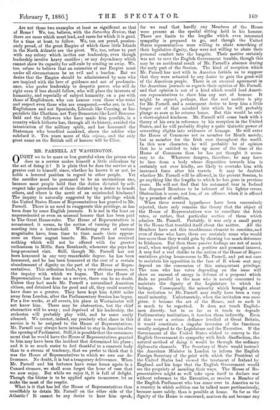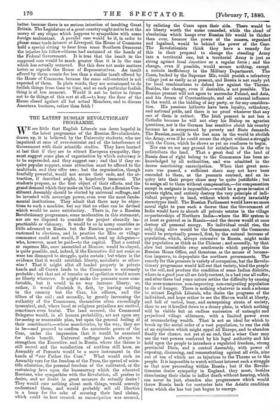MR. PARNELL AT WASHINGTON.
OUGHT we to be more or less grateful when the person who does us a service makes himself a little ridiculous by the act of doing it ? It is plain that he does the service at a greater cost to himself, since, whether he knows it or not, he holds a lowered position in regard to other people. Yet the sacrifice must be presumed to be an unconscious one, because most people hold that the duties dictated by self- respect take precedence of those dictated by a desire to benefit others, and where is the merit of an unintended kindness ? The inquiry is naturally suggested by the privilege which the United States House of Representatives has granted to Mr. Parnell. There is no need to exaggerate this privilege, as has been done by some English journals. It is not in the least an unprecedented or even an unusual honour that has been paid to The Great Home-ruler. The House of Representatives is accustomed, it seems, to the notion of turning its place of meeting into a lecture-hall. Wandering stars of various magnitudes have, from time to time, made their appear- ance on these august boards. Mr. Parnell has received nothing which will not be offered with far greater enthusiasm to Mdlle. Sara Bernhardt, whenever she pays her long-promised visit. Still, though Mr. Parnell has not been honoured in any very remarkable degree, he has been honoured, and he has been honoured at the cost of a certain abandonment of dignity on the part of the House of Repre- sentatives. This reflection leads, by a very obvious process, to the inquiry with which we began. That the House of Representatives has done us a service, there can be no doubt. Unless they had made Mr. Parnell a naturalised American citizen, and detained him for good and all, they could scarcely have done us a greater. They have kept him 4,000 miles away from London, after the Parliamentary, Session has begun. For a few weeks, at all events, his place at Westminster will not know him. There may be obstruction, but the chief obstructive will be away ; and deprived of his leadership, the orchestra will probably play wild, and be more easily silenced. We cannot, indeed, say precisely what share in this service is to be assigned to the House of Representatives. Mr. Parnell may always have intended to stay in America after the opening of Parliament. Still, it is possible that the announce- ment that he would have the House of Representatives granted to him may have been the incident that determined hi z plans ; and it is so much easier to feel thankful to a concrete body than to a stream of tendency, that we prefer to think that it was the House of Representatives to which we owe our de- liverance. No doubt, it is but a temporary deliverance. When Mr. Parnell and his fortunes have come home again in a Cunard steamer, we shall soon forget the hour of ease that we now enjoy, But while we enjoy it, it is full of delight. Though the blister is to be applied again to-morrow, let us make the most of the respite.
What is it that has led the House of Representatives thus unselfishly to detain Mr. Parnell on the other side of the Atlantic ? It cannot be any desire to hear him speak, for we read that hardly any Members of the House were present at the special sitting held in his honour. There are limits to the lengths which even interested sympathy is prepared to go, and though the United States representatives were willing to abate something of their legislative dignity, they were not willing to abate their personal comfort into the bargain. Their motive certainly was not to save the English Government trouble, though this may be an accidental result of Mr. Parnell's absence during the early part of the Session. The kind of reception which Mr. Parnell has met with in America forbids us to suppose that they were actuated by any desire to gain the good-will of the American people. There is an unusual agreement in the American journals as regards their opinion of Mr. Parnell, and that opinion is not of a kind which would lead Ameri- can representatives to show him any sort of honour. It might be argued, perhaps, that the real motive is pity for Mr. Parnell, and a consequent desire to keep him a little longer out of that mischief into which he will probably plunge as soon as he returns home. But this would be only a short-sighted kindness. Mr. Parnell will come back with a theory of his own in reference to his reception in the United States, and he will probably display a quite Quixotic power of converting slights into evidences of homage. He will enter the House of Commons not as member for Meath merely, but as member for the Irish race throughout the world. In this new character, he will probably be of opinion that he is entitled to take up more of the time of the House of Commons than he has yet thought it neces- sary to do. Whatever dangers, therefore, he may have to face from a body whose disposition towards him is certainly not over kindly, are likely to overtake him with increased force after his travels. It may be doubted whether Mr. Parnell will be allowed, in the present Session, to go anything like the lengths to which he has gone in previous years. He will not find that his autumnal tour in Ireland has disposed Members to be tolerant of his lighter errors. Obstruction is more, not less, of an offence, when it is offered by a preacher of sedition.
When these several hypotheses have been successively rejected, there only remains the theory that the object of the House of Representatives was to conciliate the Irish votes, or rather, that particular section of them which admires Mr. Parnell. Probably, it was only a small party in the House that troubled itself about the matter. All the Members have not this troublesome element to consider, and even of those who have, there are certainly some who would lose more than they would gain by showing too much deference to Irishmen. But then these passive feelings are not of much avail, when weighed against a positive and personal interest.
A may feel a real dislike to the notion of the House of Repre- sentatives giving house-room to Mr. Parnell, and yet not care
to maintain his opposition in the face of B, whose seat may depend on the concession of this unimportant privilege. The man who has votes depending on the issue will show an amount of energy in defence of a proposal which finds no • parallel in the man who is merely concerned to maintain the dignity of the Legislature to which he
belongs. Consequently, the minority which brought about
the invitation to Mr. Parnell may really have been a very small minority. Unfortunately, when the invitation was once
given, it became the act of the House, and as such it is much to be regretted. It does not touch English- men directly, but in so far as it tends to degrade Parliamentary institutions, it touches them indirectly. Even if this were a serious defiance levelled at Great Britain, it would constitute a singular inversion of the functions usually assigned to the Legislature and the Executive. If the Government of the United States wished to convey to the English Government its sympathy with Irish disaffection, the natural method of doing it would be through the ordinary diplomatic channels. The Secretary of State would instruct the American Minister in London to inform the English Foreign Secretary of the grief with which the President of the United States had viewed the treatment of Ireland by England, and his hope that the English Government would see the propriety of mending their ways. The House of Re- presentatives might as well take upon itself to declare war
without reference to the Executive, as receive a Member of the English Parliament who has come over to America as to a country in which sedition can be talked more pertinaciously, because more safely, than is possible at home. So far as the dignity of the House is concerned, matters do not become any better because there is no serious intention of insulting Great Britain. The Legislature of a great country ought not to be at the mercy of any clique which happens to sympathise with some foreign malcontent. A parallel case would be if, in order to please some trade interest at Liverpool, the House of Commons held a special sitting to hear from some Southern Democrat the injuries his fellow-citizens had sustained at the hands of the Federal Government. It is true that the insult in the supposed case would be much greater than it is in the case which has actually occurred. But this does not make matters better as regards the House of Representatives. An insult offered by them counts for less than a similar insult offered by the House of Commons, because the same self-restraint is not expected of them. In plain words, they are accustomed to do foolish things from time to time, and so each particular foolish thing is of less moment. Would it not be better in future not to do things of this sort at all,—to keep the floor of the House closed against all but actual Members, and to discuss American business, rather than Irish ?



































 Previous page
Previous page